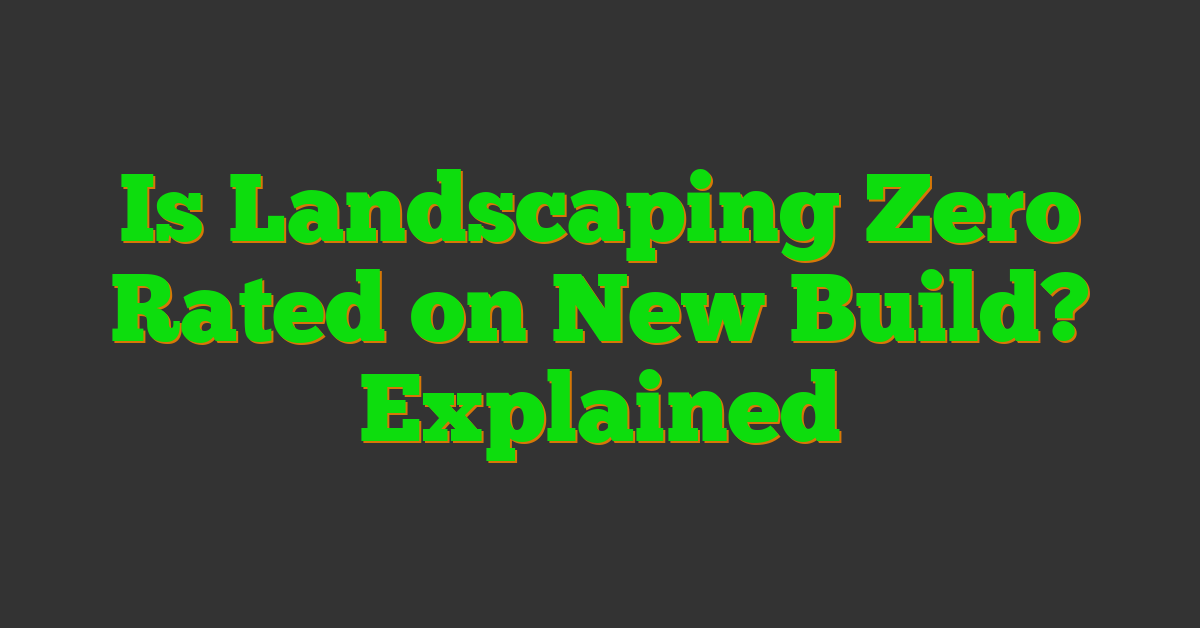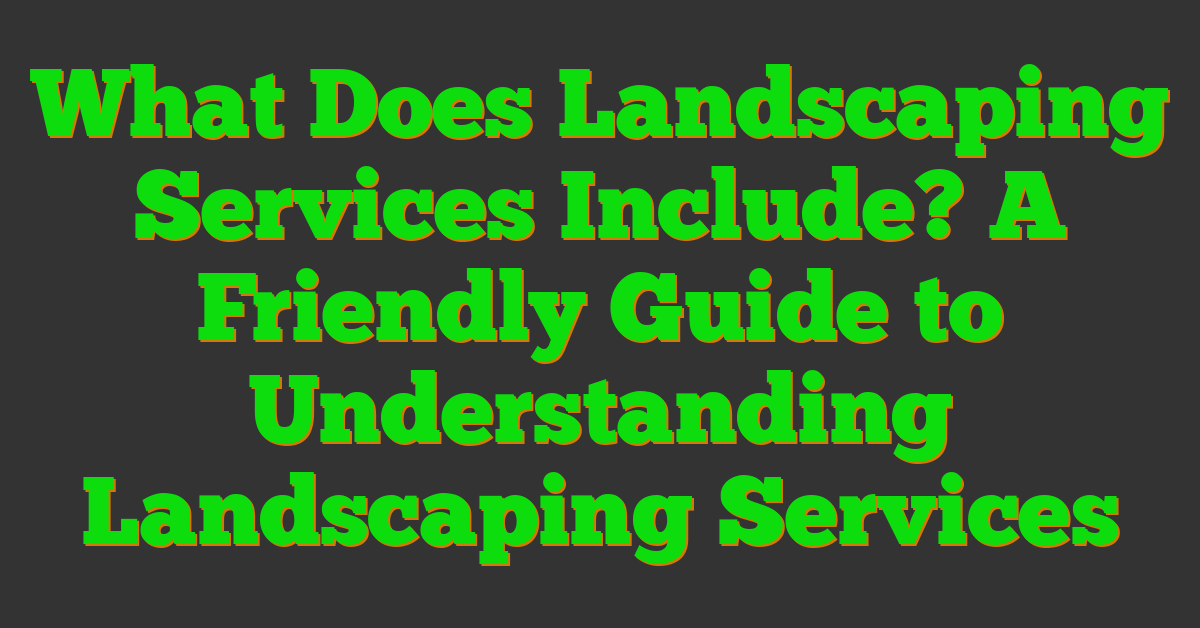If you’re building a new home or commercial property, you may be wondering about the VAT implications of landscaping. The good news is that certain types of landscaping work can be zero-rated for VAT purposes, but it’s important to understand the rules to avoid any unexpected costs.

When it comes to new builds, VAT rules can be complex and confusing. However, it’s important to get it right to avoid any penalties or additional costs. Landscaping work is often an important part of a new build project, and understanding how VAT applies to this work can help you to plan your budget more effectively.
So, is landscaping zero-rated on new builds? The answer is that it depends on the type of work you’re having done. In some cases, you may be able to zero-rate the work you do on the building itself, as long as it relates to its construction. However, there are certain caveats and exemptions to be aware of, so it’s always best to seek professional advice to ensure that you’re compliant with the rules.
Key Takeaways
- Certain types of landscaping work on new builds can be zero-rated for VAT purposes.
- To avoid unexpected costs, it’s important to understand the rules around VAT and landscaping on new builds.
- Seeking professional advice can help you to ensure that you’re compliant with VAT regulations and avoid any penalties.
Understanding VAT on New Builds

https://www.youtube.com/watch?v=YdNKPOFIIXE&embed=true
If you’re a landscaper or builder working on a new build project, understanding VAT regulations is important to ensure you don’t overcharge or undercharge your clients. Here’s what you need to know about zero-rated VAT on new builds.
Defining Zero-Rated Services
Zero-rated services are those that are exempt from VAT. This means that you don’t charge VAT on the work you do, but you can still claim back VAT on any materials you purchase.
VAT and New Construction
According to the HMRC, new construction work is typically standard-rated, which means that VAT is charged at the standard rate of 20%. However, some new construction work is zero-rated, including the construction of new dwellings and the conversion of non-residential buildings into dwellings.
Eligibility for Zero-Rated VAT
To be eligible for zero-rated VAT, the building must be a qualifying building, as defined by the HMRC. This includes buildings that have not been lived in for at least 10 years, or buildings that have been used for non-residential purposes and are being converted into dwellings.
According to the Gov.uk website, all labor on a qualifying building can be zero-rated, including landscaping work. However, you cannot zero-rate work you do after a building is finished, apart from correcting defects in the original work.
It’s important to note that not all landscaping work on new builds is zero-rated. According to Buildings and Construction (VAT Notice 708), only certain types of hard and soft landscape works are zero-rated. If you’re unsure whether your landscaping work is eligible for zero-rated VAT, it’s best to consult with a tax professional or the HMRC.
Overall, understanding VAT regulations on new builds is crucial for landscapers and builders to ensure they’re charging their clients correctly and avoiding any legal issues.
Landscaping and VAT

If you are involved in landscaping services for new build properties, it is important to understand the VAT implications. The VAT treatment of landscaping works on new build properties can be complex, and it is essential to get it right to avoid any potential issues with HMRC.
Landscaping Services and VAT Implications
Landscaping services on new build properties are subject to VAT. However, the VAT rate applicable to landscaping services depends on the type of work being carried out. Some landscaping services are zero-rated, while others are subject to the standard rate of VAT.
Soft Landscaping and Zero Rating
Soft landscaping works, such as planting, seeding, and laying turf, are generally zero-rated on new build properties. This means that no VAT is charged on these works. However, it is important to note that only basic soft landscaping works are eligible for zero-rating. If the works are more extensive than basic soft landscaping, they may be subject to the standard rate of VAT.
Exceptions and Standard Rate Items
Not all landscaping works on new build properties are eligible for zero-rating. For example, hard landscaping works, such as building walls and laying paths, are generally subject to the standard rate of VAT. Other items, such as garden furniture and water features, are also subject to the standard rate of VAT.
It is important to note that the VAT treatment of landscaping works on new build properties can be complex, and it is essential to get it right to avoid any potential issues with HMRC. If you are unsure about the VAT treatment of landscaping works on a new build property, it is advisable to seek professional advice.
Site Preparation and Services
https://www.youtube.com/watch?v=XzDeLKq28YE&embed=true
When it comes to new builds, the landscaping services you provide may be eligible for zero-rating. However, it’s important to understand which services qualify and which don’t. In this section, we’ll take a closer look at site preparation and services, including ground works, site clearance, demolition services, and VAT.
Ground Works and Site Clearance
Ground works and site clearance are essential services that prepare the site for future construction work. This can include site surveying, grading, leveling, clearing land, and drainage. If you’re providing these services as part of a new build project, they may be eligible for zero-rating.
It’s important to note that not all ground works and site clearance services are eligible for zero-rating. For example, if you’re providing these services for an existing building, they won’t qualify. Additionally, any works that are purely for landscaping purposes won’t be eligible for zero-rating.
Demolition Services and VAT
Demolition services are another important aspect of site preparation. If you’re providing demolition services as part of a new build project, they may also be eligible for zero-rating. However, it’s important to note that not all demolition services are eligible.
To qualify for zero-rating, the demolition services must be provided as part of a larger construction project. If you’re providing demolition services for an existing building that isn’t being replaced, they won’t qualify. Additionally, any demolition services that are purely for landscaping purposes won’t be eligible for zero-rating.
« Who Owns Landscape Solutions: A Quick Guide Does Landscaping Get Capitalized? Quick Guide on Capitalizing Landscaping in Writing »
In summary, if you’re providing ground works, site clearance, or demolition services as part of a new build project, they may be eligible for zero-rating. However, it’s important to ensure that the services you’re providing meet the eligibility criteria.
Materials and Appliances

Building Materials VAT Treatment
When it comes to building materials, the VAT treatment depends on whether the building is new or existing. For new builds, the materials are usually zero-rated for VAT purposes. This means that you won’t have to pay VAT on the materials you purchase for your new build project. However, it’s worth noting that some materials may not be eligible for zero-rating. For example, some types of insulation and glazing may be subject to the standard rate of VAT.
Appliances and Fittings
The VAT treatment for appliances and fittings also depends on whether the building is new or existing. For new builds, the appliances and fittings are usually zero-rated for VAT purposes. This means that you won’t have to pay VAT on the appliances and fittings you purchase for your new build project. However, it’s worth noting that some appliances and fittings may not be eligible for zero-rating. For example, some types of kitchen appliances and bedroom furniture may be subject to the standard rate of VAT.
It’s important to keep in mind that the VAT treatment for labour is different from that of materials and appliances. Labour is generally standard-rated for VAT purposes, regardless of whether the building is new or existing. This means that you will have to pay VAT on the labour costs associated with your new build project.
Overall, it’s important to understand the VAT treatment for materials and appliances when planning your new build project. By doing so, you can ensure that you are not paying more VAT than necessary and that your project stays within budget.
Planning and Professional Services

When building a new property, there are several planning and professional services that you may need to consider. In this section, we will discuss two of the most important services that you may need to use, and how VAT applies to them.
Planning Permission and VAT
If you are building a new property, you will need to obtain planning permission from your local council. Planning permission is a legal requirement that ensures your building project meets certain standards and regulations. When it comes to VAT, planning permission is not usually zero-rated, which means you will need to pay VAT on any fees associated with obtaining planning permission.
Architects, Surveyors, and Contractor Fees
When building a new property, you may also need to hire architects, surveyors, and contractors to help you with the project. These professionals will charge fees for their services, and you will need to pay VAT on these fees. However, some services provided by architects, surveyors, and contractors may be zero-rated for VAT purposes. For example, if an architect is providing a design service for a new build property, this service may be zero-rated for VAT purposes.
It is important to note that not all services provided by architects, surveyors, and contractors will be zero-rated for VAT purposes. For example, if a contractor is carrying out work on an existing building, this work will not be zero-rated for VAT purposes. Similarly, if a surveyor is providing a valuation service for an existing property, this service will not be zero-rated for VAT purposes.
In conclusion, when building a new property, it is important to consider the planning and professional services that you will need to use. While some of these services may be zero-rated for VAT purposes, others will not be. It is important to speak to your service providers about the VAT implications of their services before you engage them.
VAT Refund Scheme
https://www.youtube.com/watch?v=PAQhH9EvYfk&embed=true
If you are a DIY housebuilder, you may be eligible for a VAT refund on the materials and services used in the construction of your new home. Landscaping is not typically eligible for a VAT refund unless it is part of a larger project that includes the construction of a new building.
Claiming a VAT Refund
To claim a VAT refund, you must first register for the VAT DIY Scheme with HM Revenue and Customs (HMRC). Once registered, you can claim a refund on the VAT paid for eligible goods and services.
To be eligible for a VAT refund, the goods and services must have been purchased within three months before or after the date of the certificate of completion for the new building. The certificate of completion is issued by your local authority once the building work is finished.
Documentation and VAT Invoices
To claim a VAT refund, you will need to provide documentation to HMRC. This includes VAT invoices for the eligible goods and services, as well as evidence of payment. If you do not have a VAT invoice, you can ask the supplier to provide one.
It is important to keep accurate records of all purchases and payments, as well as any correspondence with suppliers and HMRC. This will help to ensure that your claim is processed quickly and accurately.
Overall, the VAT refund scheme can provide significant savings for DIY housebuilders. However, it is important to ensure that you meet all of the eligibility criteria and provide the necessary documentation to HMRC.
Special Considerations for New Builds

If you’re a landscaper working on new builds, there are a few special considerations you need to keep in mind regarding VAT. Here are some key things to keep in mind:
Annexes and Conversions
If you’re working on an annexe or conversion, the VAT rules can be a bit tricky. According to VAT Notice 708, “the construction of an annexe or extension to an existing building can be zero-rated if it is designed as a separate dwelling.” However, if the annexe or extension is not designed as a separate dwelling, then it will be subject to the standard VAT rate.
Mixed-Use Buildings and Residential Parts
If you’re working on a mixed-use building or a residential part of a building, the VAT rules can also be a bit complicated. According to VAT Notice 708, “if a building is used for both residential and non-residential purposes, you must apportion the cost of the work between the two uses.” The residential part of the building will be subject to the reduced VAT rate, while the non-residential part will be subject to the standard VAT rate.
It’s important to keep these rules in mind when working on new builds. If you have any questions about VAT and new builds, it’s always a good idea to consult with a qualified accountant or tax professional.
Regulations and Compliance
https://www.youtube.com/watch?v=BFD8cvvdlwM&embed=true
When it comes to landscaping on new build properties, it is important to understand the regulations and compliance requirements. This section will cover the Building Regulations and VAT, as well as what is considered Closely Connected and Habitable Spaces.
Building Regulations and VAT
According to the UK government’s guidance on Buildings and Construction (VAT Notice 708), “the construction of a new building is zero-rated for VAT purposes.” This means that if you are a contractor or subcontractor working on a new build property, you can zero-rate the work you do on the building itself as long as it relates to its construction. This also applies if you are working on a closely connected and habitable space.
However, it is important to note that not all landscaping work is zero-rated. For example, if you are working on a garden that is not closely connected to the new build property, you will need to charge VAT at the standard rate.
Closely Connected and Habitable Spaces
The term “closely connected” is not specifically defined in the VAT legislation. However, HM Revenue and Customs (HMRC) has provided some guidance on what is considered closely connected to a new build property. According to HMRC, “work is closely connected if it is part of the construction of the building or is required to make the building habitable or fit for purpose.”
This means that if you are working on a garden or landscaping project that is required to make the new build property habitable or fit for purpose, you may be able to zero-rate the work. For example, if you are creating a patio area that is required for access to the new build property, this would be considered closely connected and may be zero-rated.
In conclusion, it is important to understand the regulations and compliance requirements when it comes to landscaping on new build properties. By following the guidance provided by HMRC and the UK government, you can ensure that you are charging the correct amount of VAT and complying with the relevant regulations.
Frequently Asked Questions
https://www.youtube.com/watch?v=BhHqm6xRoeQ&embed=true
What does zero-rated VAT mean for landscaping services on new constructions?
Zero-rated VAT means that the landscaping services provided for new constructions are exempt from VAT. This means that the customer does not have to pay VAT on the services provided, and the business providing the services does not have to charge VAT on them.
Are there specific conditions under which landscaping for new builds is exempt from VAT?
Yes, there are specific conditions under which landscaping for new builds is exempt from VAT. According to HMRC, the work done on the building itself can be zero-rated, as long as the work relates to its construction. This also applies if you’re a sub-contractor who’s working for another builder. Work that is closely connected to the building, such as laying turf or planting trees, is also zero-rated.
How does VAT Notice 708 apply to landscaping services?
VAT Notice 708 provides guidance on the VAT treatment of construction services and related goods. It explains which construction services and goods are zero-rated, reduced-rated, or standard-rated for VAT purposes. Landscaping services for new builds fall under the zero-rated category, as long as they meet the specific conditions outlined in the notice.
Can VAT be reclaimed on gardening equipment for a new build project?
Yes, VAT can be reclaimed on gardening equipment purchased for a new build project, as long as the equipment is used solely for business purposes. This includes equipment such as lawnmowers, hedge trimmers, and shovels.
What building materials are eligible for zero-rated VAT in relation to new build landscaping?
Building materials used for new build landscaping can be eligible for zero-rated VAT if they are used solely for business purposes. This includes materials such as topsoil, turf, plants, and trees.
How should a business report zero-rated landscaping services for a new build in their VAT return?
A business should report zero-rated landscaping services for a new build in their VAT return by including them in Box 6 of the return. This is the total value of all supplies made that are zero-rated. The business should also keep records of the transactions and any relevant invoices to support the zero-rated treatment.











